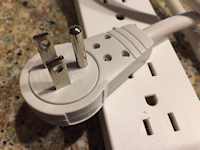
Day In The Life
 Working as an engineer
is much different than training to be an engineer. Unlike school, there is
no typical day. Most engineers work in office buildings, laboratories, or
industrial plants. Others may spend time outdoors at construction sites
and oil and gas exploration and production sites, where they monitor or
direct operations or solve onsite problems. Some engineers travel
extensively to plants or worksites here and abroad. Many engineers work
a standard 40-hour week. At times, deadlines or design standards may
bring extra pressure to a job, requiring engineers to work longer hours. Working as an engineer
is much different than training to be an engineer. Unlike school, there is
no typical day. Most engineers work in office buildings, laboratories, or
industrial plants. Others may spend time outdoors at construction sites
and oil and gas exploration and production sites, where they monitor or
direct operations or solve onsite problems. Some engineers travel
extensively to plants or worksites here and abroad. Many engineers work
a standard 40-hour week. At times, deadlines or design standards may
bring extra pressure to a job, requiring engineers to work longer hours.
 Working
in Teams Working
in Teams
In the working world it is the success of the
team that counts. The team itself may be formal with a designated leader
and everyone with defined roles, or loosely constructed and informal in
nature. The team may be made up of several people or just you and one
other person. Often, teams draw from several departments in an
organization. You will encounter colleagues of diverse backgrounds,
temperaments, and levels of ability and education. It is up to you to work
successfully in the group.
 Specializing Specializing
Many
electrical and electronics engineers specialize in a
branch, such as controls systems, and
in an application area, such as medical, computer, missile guidance, and
power distribution. All engineers have in common the work they do:
applying scientific knowledge to solve technical problems and develop
products and services that benefit society. Engineering work is by its
very nature interdisciplinary, often bringing together engineers with
diverse expertise in not only electronics and power engineering, but also
in mechanics, chemistry, physics, mathematics, materials sciences, and
many other areas. The basic functions of engineering are defined by the
sequencing of engineering work: research, design and development, testing,
manufacturing, construction, service and maintenance, and management.
Engineers also apply their expertise in non-engineering jobs such as
purchasing, sales, law, human resources, education, and consulting.
Research
Research jobs often involve starting with an idea or a need. Theories are
formulated, tested and prototyped. Jobs in research can be found at
universities, national laboratories as well as private institutions and
corporations.
Design
and Development
In design and development, the results of research are applied to
practical problems. The term, development, refers to the early stages of a
project. Design refers more to the later stages of a project when the
basic methodology is established. In some companies, research and
development are combined.
Testing
and Evaluation
Testing and evaluation can take place in the lab or in the field, often
working with equipment, software, systems and the end users. Those who
test are not the designers.
Application
/ Manufacturing
Jobs oriented towards the mass production of the product or delivery of
the service. Although usually not directly in charge of production
personnel, engineers are responsible for solving problems associated with
the manufacturing process.
Maintenance
/ Service
Engineering and technical jobs concerned with operations- maintaining and
making modifications to hardware and systems.
Management
Management jobs often require elements of leadership, planning,
coordination, supervision; working with staff, budgets and administration.
Other
Functions
Sales engineers sell technical solutions to clients. Customer service reps
solve critical problems that occur in the field. Engineers serve on
marketing teams and some have gone from engineering to a career in human
resources.
Note: Some resources in this section are provided by
IEEE and the US Department
of Labor, Bureau of Labor Statistics.
|
|